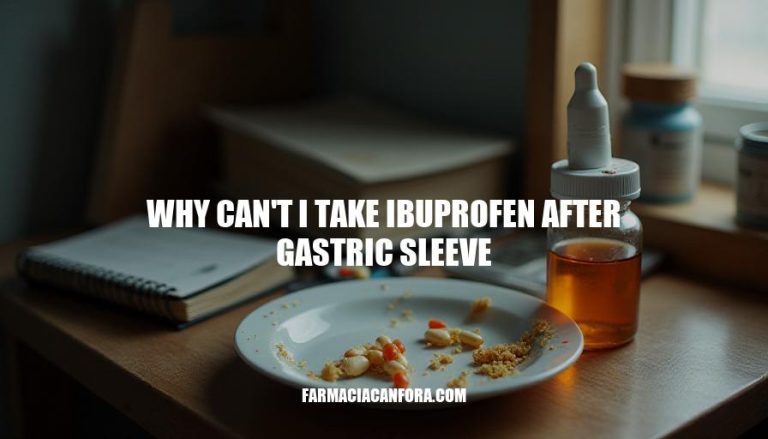


After undergoing gastric sleeve surgery, patients often wonder, “Why can’t I take ibuprofen?” This concern arises because ibuprofen, a common pain reliever, can irritate the stomach lining and increase the risk of ulcers and bleeding, especially in a stomach that is healing post-surgery. Understanding medication restrictions is crucial to ensure a smooth recovery and avoid complications.
Gastric sleeve surgery, also known as sleeve gastrectomy, involves removing about 80% of the stomach, leaving a narrow, tube-like “sleeve”. This significantly reduces the stomach’s capacity, limiting food intake and promoting a feeling of fullness with smaller portions.
After this surgery, the stomach is more sensitive and has a reduced ability to produce protective mucus. Taking ibuprofen, a nonsteroidal anti-inflammatory drug (NSAID), can irritate the stomach lining and increase the risk of ulcers and bleeding. This is why ibuprofen is generally not recommended after gastric sleeve surgery.
Ibuprofen, a common NSAID, can irritate the stomach lining by reducing protective prostaglandins, leading to increased gastric acid secretion and diminished mucous production. This can cause gastritis, ulcers, and bleeding.
After a gastric sleeve surgery, the stomach is more sensitive and has a reduced capacity. Taking ibuprofen can exacerbate irritation, increase the risk of ulcers, and slow down healing. This is why it’s generally advised to avoid ibuprofen post-surgery.
Taking ibuprofen after gastric sleeve surgery poses several specific risks:
These risks explain why ibuprofen is not recommended after gastric sleeve surgery: the medication can cause significant harm to the already sensitive and healing stomach.
After gastric sleeve surgery, it’s crucial to avoid ibuprofen because it can irritate the stomach lining, increasing the risk of ulcers and bleeding. Here are some safer alternatives:
These alternatives are safer because they minimize the risk of gastrointestinal complications, which are more likely with NSAIDs like ibuprofen.
After undergoing gastric sleeve surgery, patients should be cautious when taking ibuprofen due to its potential to irritate the stomach lining, increase the risk of ulcers and bleeding, and slow down healing.
The reduced stomach size and sensitivity post-surgery make it more prone to complications from nonsteroidal anti-inflammatory drugs (NSAIDs) like ibuprofen. To mitigate this risk, safer alternatives can be used for pain relief, including:
It is crucial to understand the risks associated with ibuprofen after gastric sleeve surgery and adhere to medical advice to ensure a smooth recovery.